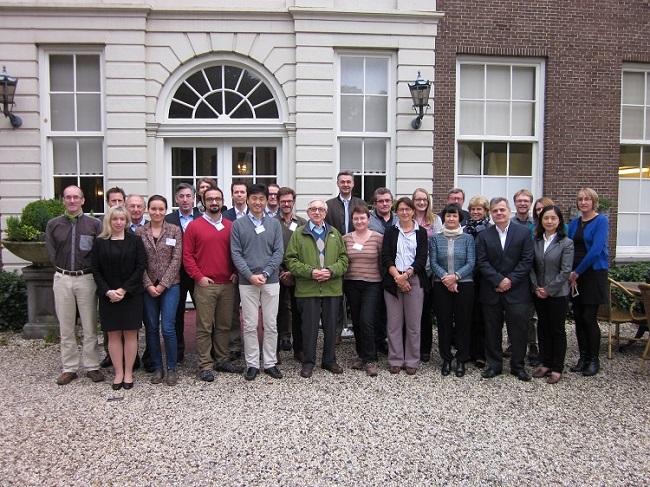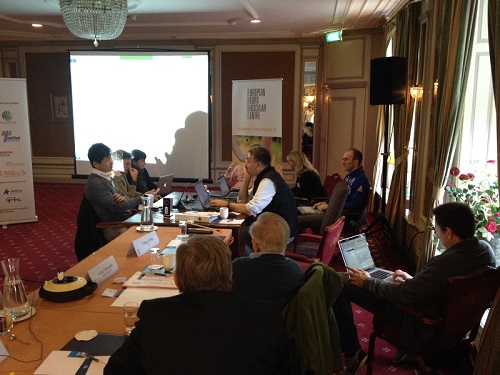Establishing an international consortium for gene discovery and clinical research for Congenital Muscle Diseases
- Number 214
- Date 16 October 2015
Location: Heemskerk
Organisers: Assoc. Prof. Daniel MacArthur (Boston, USA); Prof. Carsten Bonnemann (Bethesda, USA); Assoc. Prof. James J. Dowling (Toronto, Canada); Dr. Jocelyn Laporte (Strasbourg, FR)
Participants: Alan Beggs (Boston, USA), Gisele Bonne (Paris, FR), Carsten Bonnemann (Bethesda, USA), Sandra Donkervoort (Bethesda, USA), James Dowling (Toronto, CAN), Victor Dubowitz (London, UK), Michael Goldberg (RYR1 Foundation, USA), Morton Goldberg (RYR1 Foundation, USA), Yann Herault (Paris, FR), Mert Karakaya (Koln, GER), Jocelyn Laporte (Strasbourg, FR), Anne Lennox (MTM Trust, UK), Daniel MacArthur (Boston, USA), Edoardo Malfatti (Paris, FR), Katherine Mathews (Iowa City, USA), Marina Mora (Milan, IT), Ichizo Nishino (Tokyo, JP), Emily Oates (via WebEx) (Sydney, AU), Anne Rutkowski (CureCMD, USA), Melanie Spring (MTM Trust, UK), Nicol Voermans (Nijmegen, NL), Jodi Warman (Ottawa, CAN), Tobias Willer (Regeneron, USA), Hui Xiong (Beijing, CH), Irina Zaharieva (London, UK), Edmar Zanoteli (Sao Paolo, BR)
This workshop was sponsored by the ENMC members, the ENMC Company Forum (Amicus, Genzyme, PTC and Santhera), Foundation Building Strength, Myotubular Trust and Cure CMD.
Description: The 214th ENMC workshop entitled “establishing an international consortium for gene discovery and clinical research for congenital muscle diseases” took place from the 16th-18th of October 2015 in Heemskerk, Netherlands. A multidisciplinary group of 26 participants took part in this workshop, including 22 clinical and basic science researchers from 11 different countries (France, the UK, Japan, Canada, Brazil, China, Turkey, Italy, the Netherlands, Australia, and the USA) and 4 patient representatives (Myotubular Trust, RYR1 Foundation and CureCMD).

The participants of the 214th ENMC workshop
Background: Congenital muscle diseases are a group of conditions encompassing the congenital myopathies (CM) and the congenital muscular dystrophies (CMD). Individually, these are very rare conditions, but collectively they represent a major subset of neuromuscular diseases across the lifespan. CM/CMDs are associated with significant disabilities and early mortality in most instances. While there is good evidence that subtype specific supportive care measures improve symptomatology, there are currently no cures or significant disease modifying specific therapies. A key existing barrier to clinical care and therapy development for CM/CMDs is a lack of genetic diagnosis in the majority of cases. This is due in some cases to inadequate testing of known CM/CMD genes and in others to currently unknown/unsolved genetic causes. At present, there are approximately 45 CM/CMD disease genes, and this likely represents 50% of the predicted genetic disease burden. There is therefore a great need (a) for better access to and application of clinical testing of the known CM/CMD genes and (b) for concerted gene discovery efforts aimed at identifying the remaining genetic causes of disease, each one of which will be very rare, necessitating an international collaborative approach to their discovery.
Aim of this workshop: The best way to address the barriers created by lack of knowledge of the genetic bases of CM/CMD is to have the experts and stake holders in this field working together. Therefore, the primary goal of this workshop was to accomplish this by establishing a consortium for the study of the genetics of congenital muscle diseases. Within this overarching aim, additional goals included defining the mission of the consortium and the initial projects for the group.
What was achieved: In the first half of the workshop, we defined the existing independent efforts at gene discovery for CM/CMD, discussed infrastructure that currently exists for these efforts (both for CM/CMD and for rare genetic diseases in general), and learned about existing networks related to other disease groups. In the second half of the workshop, we formally established an international CM/CMD consortium, and decided upon additional prospective members to be invited after the conclusion of the meeting. We agreed that the mission statement of this consortium is “all individuals with CM/CMD deserve to have defined the genetic basis of their disease”, and proposed to begin addressing this mission through 3 initial efforts.
Key deliverables: These efforts, to be promoted by working groups within the consortium, represent the key deliverables of the workshop, and include (1) development of a clinical genetic testing platform for individuals without current access to testing, (2) creation of a data sharing platform for existing cohorts, and (3) development of a common phenotyping platform. The goal is that the working groups will have formulated plans for each of these initiatives within 8 weeks of the meeting. The secondary goal is that these deliverables will be successfully implemented within 18 months of the workshop, whereupon a second meeting of the consortium will take place.
A full report is published in Neuromuscular Disorders (pdf)

Groups discussions on Sunday
